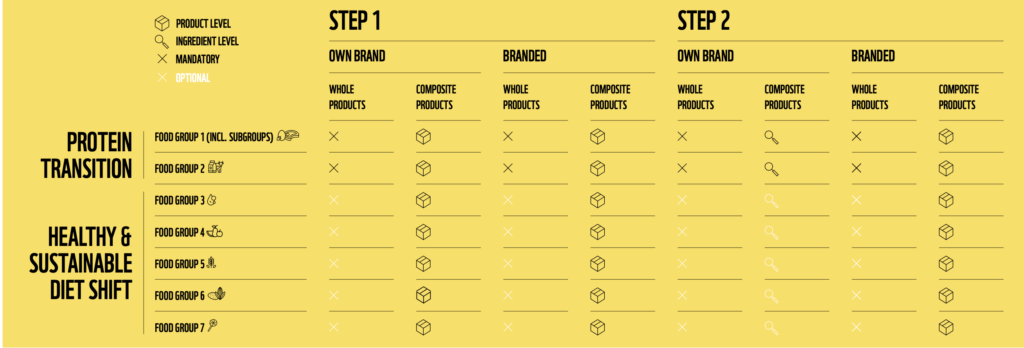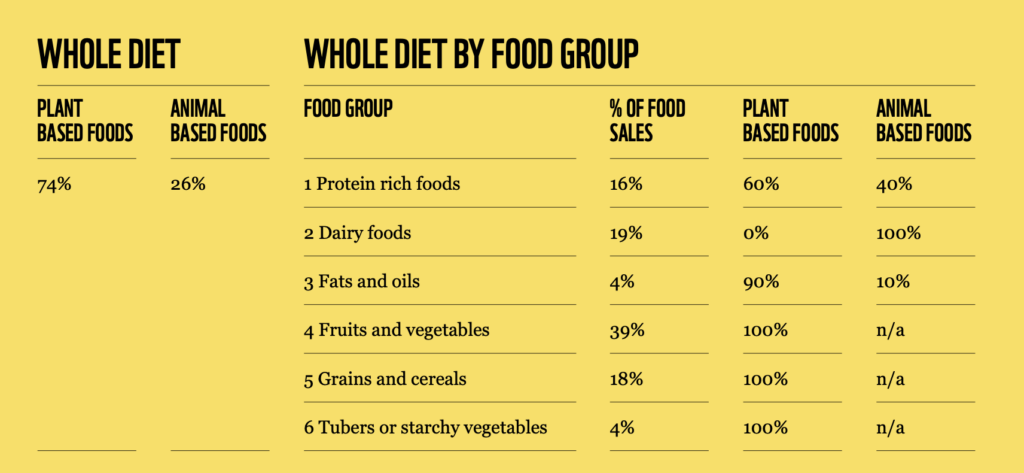On World Food Day, the World Wildlife Fund (WWF) launched an innovative tool aimed at guiding supermarkets in aligning their sales with climate objectives. The Planet-Based Diets Retailer Methodology seeks to revolutionise the food retail sector by encouraging retailers to prioritise plant-based foods over animal protein, addressing the urgent need for a more sustainable food system.
With meat and dairy accounting for a staggering 57% of agrifood emissions—equating to up to one-fifth of the world’s total emissions—and consuming 80% of farmland and 30% of global freshwater, the need for change is clear. Despite this disproportionate resource consumption, livestock farming provides only 17% of the world’s calories and 38% of its protein. Experts warn that without addressing agriculture, emissions from the food system will hinder efforts to meet climate targets, potentially exceeding the critical thresholds of 1.5°C and 2°C.
In stark contrast, vegan diets have been shown to reduce emissions, land use, and water pollution by 75% compared to meat-rich diets. Even a moderate shift—replacing just half of meat consumption with plant-based alternatives—could lower farm and land use emissions by nearly one-third, helping to halt deforestation and alleviate hunger by 3.6%.
Recognising the vital role retailers play in the food supply chain, WWF’s new methodology serves as a roadmap for achieving the protein transition—shifting from animal to plant-based food sources. Retailers are critical in accelerating the transition to healthy and sustainable diets, particularly in countries with high consumption-related environmental impacts. This transition requires a rapid transformation of food environments, making healthy and sustainable foods more affordable and accessible to all.
The Planet-Based Diets Retailer Methodology provides a structured, step-by-step approach to support supermarkets in promoting plant-based consumption. The methodology breaks down food sources into seven categories—meat, plant proteins, dairy, fats, fruits and vegetables, grains, and snacks—allowing retailers to measure and balance sales of animal-source and plant-based foods. A key feature of the methodology is its recommendation to measure food sales by weight, rather than protein content, which allows for a more comprehensive view of a retailer’s offerings.

Stepwise approach to data collection. Step 1 focuses on the split of animal/plant-based sales of whole products (branded and own brand) while also categorizing composite products into groups (meat-based, seafood-based, vegetarian, vegan).
Step 2 further breaks down composite products (own brand) into their constituent ingredients, allowing for a more detailed analysis. Both steps allow for measuring the overall diet instead of protein transition only.
Courtesy of WWF
WWF Pushes for 74:26 Plant-Based Sales Shift to Drive Sustainability
WWF urges retailers to establish clear targets for rebalancing their sales, recommending a goal of achieving a 60% share of plant-based protein in their offerings. Additionally, the organisation calls for an overall sales split of 74% in favour of plant-based foods across all categories, including vegetables, grains, and other food groups. Retailers must adapt their sales strategies to meet their sustainability commitments and contribute to global goals. Intensive agriculture is a leading driver of the decline of wildlife and nature, making it crucial for food retailers to promote healthy, sustainable dietary choices.

Table: Proportions of an optimal diet according to the Planetary Health Diet, including the respective plant vs. animal splits. The sales and consumption of food group 7 should be reduced overall.
Courtesy of WWF
European Retailers Lead the Way in Sustainable Protein and Dietary Shifts
Some retailers in Europe are already taking significant steps towards these goals. Companies like Lidl and Ahold Delhaize have set ambitious protein ratio targets in specific markets, positioning themselves as leaders in the transition towards a more sustainable food system.
In addition to encouraging the protein transition, the methodology also advocates for broader dietary changes, urging retailers to track the sales proportions of whole grains versus refined grains and the sources of fats in their products. Furthermore, the report highlights the importance of reformulating high-salt, high-fat meat analogues and fortifying dairy alternatives to support a healthy transition to plant-based diets.
WWF’s Planet-Based Diets Retailer Methodology represents a crucial step in the fight against climate change, offering a practical and effective approach for retailers to lead the charge towards sustainable food systems. By embracing this transition, supermarkets can significantly contribute to restoring nature, mitigating climate impacts, and enhancing consumer health and wellbeing.
For more information
The Plant -Based Diets Retailer Methodology
https://wwfint.awsassets.panda.org/downloads/wwf-planet-based-diets-retailer-methodology.pdf

